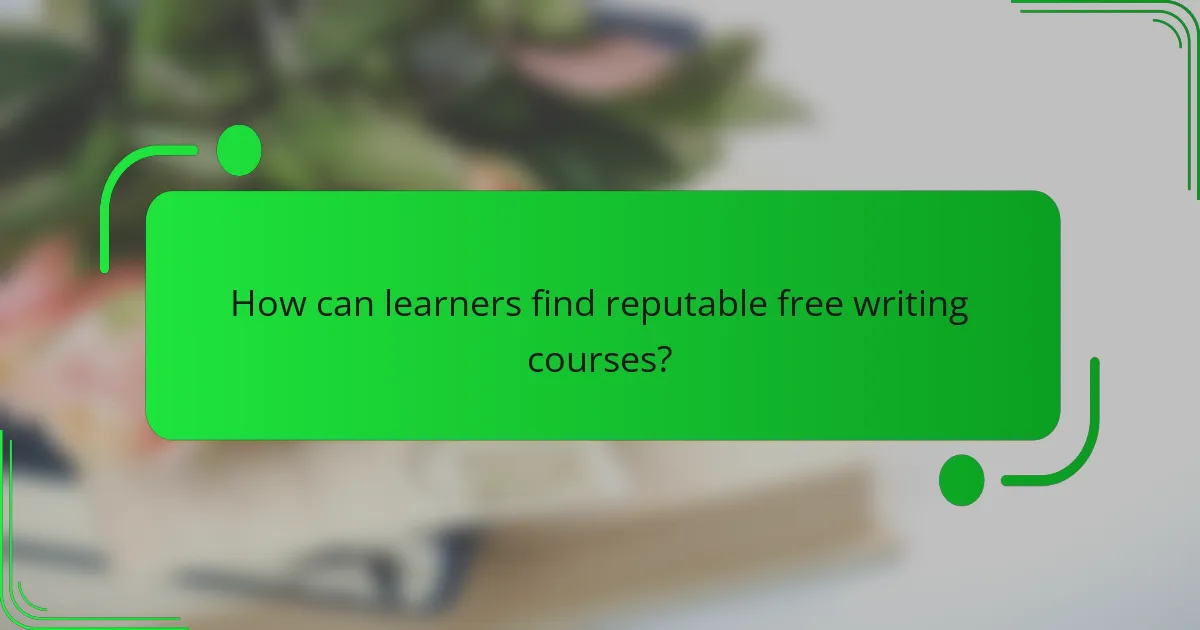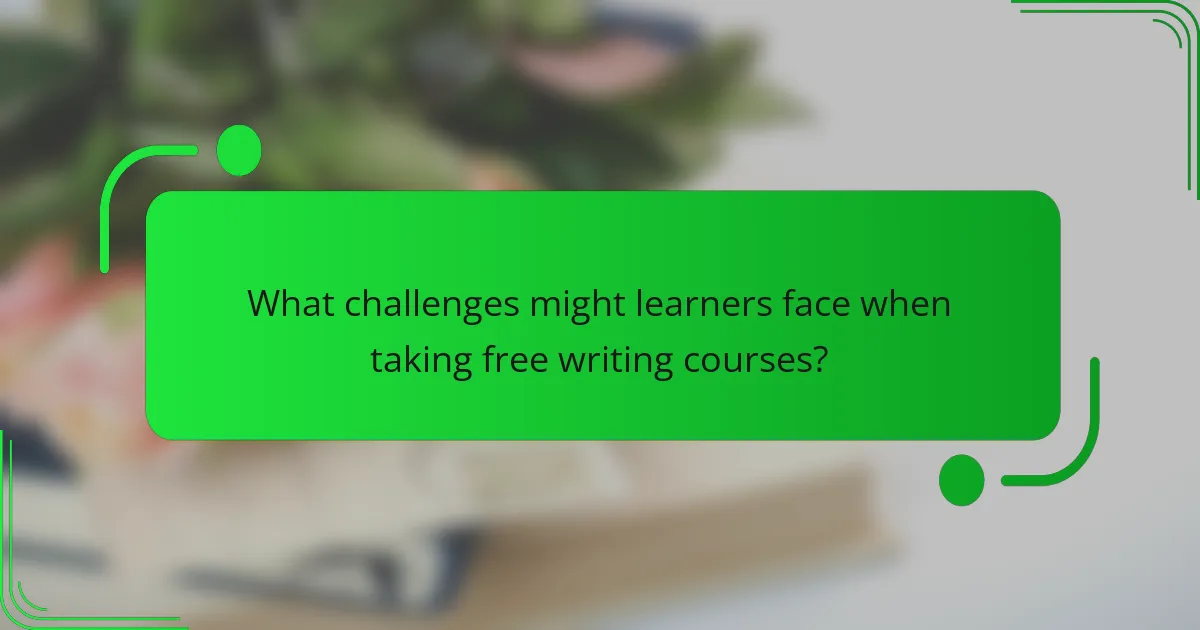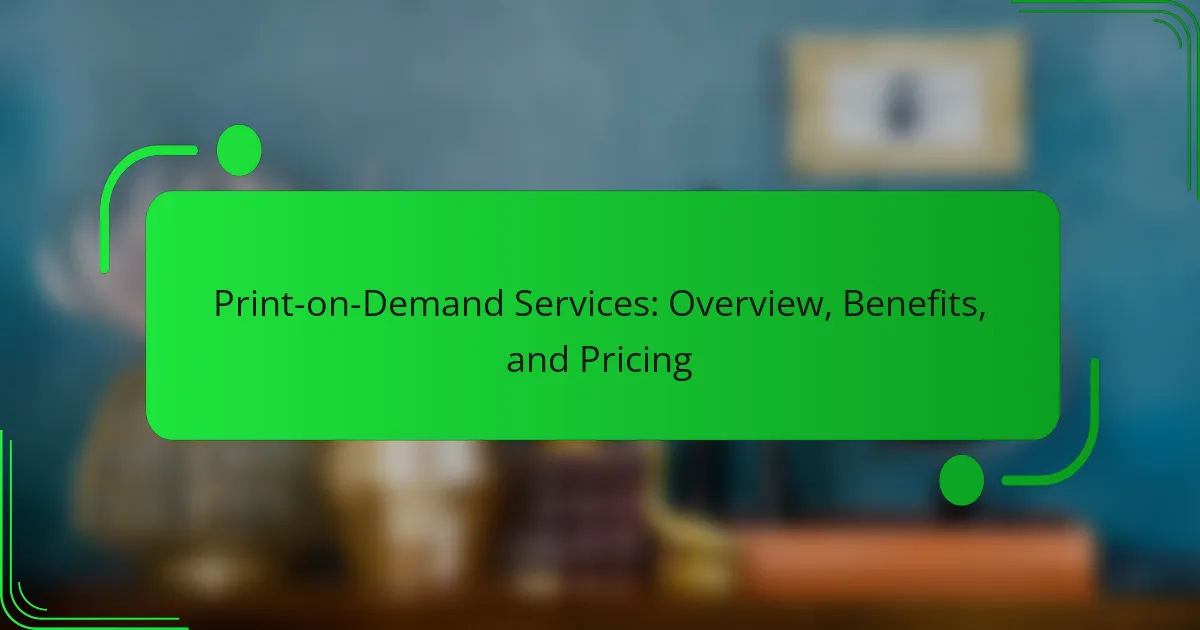Free writing courses provide valuable opportunities to enhance writing skills, boost creativity, and foster connections with other writers. These courses are available in various formats, including online workshops and self-paced programs. Participants can find reputable options through platforms like Coursera and educational institutions. While challenges such as lack of structure and limited feedback may arise, engaging fully can maximize the benefits of these learning experiences.

What are the key benefits of enrolling in free writing courses?
Enrolling in free writing courses offers numerous benefits, including skill enhancement, increased creativity, and networking opportunities. Participants improve their writing techniques and gain confidence through structured feedback. These courses often provide access to diverse formats such as online workshops and in-person classes, catering to various learning preferences. Additionally, students can connect with fellow writers, fostering a supportive community that encourages growth and collaboration.
How do free writing courses enhance creativity and expression?
Free writing courses enhance creativity and expression by providing structured environments for exploration. Participants engage in spontaneous writing, which fosters original thought and reduces self-censorship. These courses often include varied formats, such as workshops and online classes, making them accessible to diverse audiences. Benefits include improved writing skills, increased confidence, and the ability to articulate thoughts clearly. Engaging with prompts and peer feedback further stimulates creative thinking, leading to unique personal expression.
What skills can be developed through free writing courses?
Free writing courses help develop skills such as creativity, self-expression, and critical thinking. Participants enhance their ability to articulate thoughts clearly and improve their writing fluency. These courses often foster a supportive environment that encourages experimentation with different writing styles and techniques. Additionally, they can build confidence in personal voice and storytelling abilities, making writing a more enjoyable and productive process.
Why are free writing courses valuable for professional development?
Free writing courses are valuable for professional development as they enhance writing skills, boost creativity, and improve communication. These courses are often available online, making them accessible to a wide audience. They typically come in various formats, including workshops, webinars, and self-paced modules. The benefits include increased confidence in writing, the ability to articulate ideas clearly, and opportunities for networking with peers. Engaging in free writing courses can lead to unique insights and innovative thinking, essential for career advancement.

Which formats of free writing courses are available to learners?
Free writing courses are available in various formats, including online courses, workshops, webinars, and self-paced programs. Each format caters to different learning preferences and schedules. Online courses provide flexibility, while workshops offer interactive experiences. Webinars often focus on specific topics, and self-paced programs allow learners to progress at their own speed.
What are the differences between online and in-person free writing courses?
Online free writing courses provide flexibility and accessibility, while in-person courses offer direct interaction and immediate feedback. Online formats allow participants to learn at their own pace, often accommodating various schedules. In contrast, in-person courses foster a sense of community and can enhance motivation through peer engagement. Both formats have unique benefits, but the choice depends on individual learning preferences and goals.
How do self-paced courses compare to scheduled classes?
Self-paced courses offer flexibility, while scheduled classes provide structure. Self-paced courses allow learners to progress according to their own schedules, accommodating various lifestyles. In contrast, scheduled classes foster a sense of community and accountability through fixed timelines and peer interaction. Self-paced courses often feature a variety of formats, such as video lectures and interactive exercises, enhancing accessibility. Scheduled classes may include live discussions and immediate feedback, promoting engagement. Ultimately, the choice depends on individual learning preferences and goals.
What multimedia resources are commonly used in free writing courses?
Free writing courses commonly utilize multimedia resources such as video lectures, interactive writing prompts, audio recordings, online forums, e-books, and visual aids. These resources enhance engagement and support various learning styles. For instance, video lectures provide visual context, while audio recordings offer an auditory learning experience. Interactive prompts encourage active participation, and online forums foster community discussion and feedback. E-books serve as accessible reference materials, and visual aids help illustrate concepts effectively.

How can learners find reputable free writing courses?
Learners can find reputable free writing courses through online platforms, educational institutions, and writing organizations. Websites like Coursera, edX, and FutureLearn offer high-quality courses from recognized universities. Many community colleges provide free resources or workshops. Additionally, writing organizations often host free webinars or workshops. Checking reviews and ratings can help identify the best options.
What platforms offer free writing courses with high ratings?
Several platforms offer free writing courses with high ratings, including Coursera, edX, FutureLearn, and Skillshare. These platforms provide diverse formats such as video lectures, interactive assignments, and peer reviews. Benefits include access to expert instructors, flexible learning schedules, and community support. For example, Coursera partners with universities, ensuring high-quality content and recognized certifications.
How do user reviews influence the choice of writing courses?
User reviews significantly influence the choice of writing courses by providing insights into course quality and effectiveness. Prospective students often rely on feedback from previous participants to assess the course content, instructor expertise, and overall learning experience. Positive reviews can enhance a course’s credibility, while negative feedback may deter enrollment. Additionally, reviews often highlight unique attributes of courses, such as interactive formats or personalized feedback, which can sway decision-making. The availability of free writing courses further amplifies the impact of reviews, allowing learners to explore options without financial commitment.

What unique features distinguish certain free writing courses from others?
Certain free writing courses stand out due to their unique features such as specialized curriculum, personalized feedback, and innovative teaching methods. These attributes enhance the learning experience and cater to diverse writing goals. For example, some courses offer mentorship from published authors, while others focus on specific genres or writing styles. Additionally, flexibility in formats, such as online workshops or self-paced modules, allows learners to choose what best fits their schedules. These distinctive elements contribute to a more tailored and effective writing education.
How do specialized courses cater to different writing genres?
Specialized courses cater to different writing genres by offering targeted instruction and resources. These courses address unique aspects of each genre, such as style, structure, and audience engagement. For instance, creative writing courses focus on narrative techniques, while technical writing courses emphasize clarity and precision. Additionally, workshops may provide feedback tailored to genre-specific conventions. This specialization enhances writers’ skills, allowing them to excel in their chosen fields.
What role do guest instructors play in enhancing course value?
Guest instructors significantly enhance the value of free writing courses by providing diverse perspectives and expertise. Their unique backgrounds enrich the curriculum, offering students fresh insights and techniques. This exposure can lead to improved writing skills and an expanded understanding of various writing styles. Additionally, guest instructors often bring real-world experience, making lessons more relevant and engaging for students. Their involvement can also foster networking opportunities, connecting students with industry professionals.

What challenges might learners face when taking free writing courses?
Learners may face several challenges when taking free writing courses. Common issues include lack of structure, difficulty with self-motivation, and limited feedback from instructors.
Many learners struggle with the absence of a clear framework, making it hard to organize thoughts. Additionally, self-discipline is crucial, as free writing requires consistent practice without external deadlines.
Feedback can be sparse in online formats, which may hinder progress and improvement. Some learners might also experience anxiety about sharing their work, impacting their willingness to engage fully.
Finally, varying levels of writing experience among participants can create disparities in comfort and skill, affecting group dynamics and individual confidence.
How can time management affect participation in writing courses?
Time management significantly influences participation in writing courses. Effective time management allows individuals to allocate sufficient hours for course activities, enhancing learning outcomes.
Participants who prioritize their schedules can engage more fully in assignments and practice writing regularly. This consistent practice leads to improved skills and increased confidence in writing.
Additionally, those who manage their time well are more likely to complete courses, benefiting from structured feedback and peer interactions. This engagement fosters a supportive learning environment, essential for developing writing proficiency.
In contrast, poor time management can lead to missed deadlines and reduced participation, ultimately hindering the overall educational experience.
What common technical issues arise during online writing courses?
Common technical issues during online writing courses include connectivity problems, platform compatibility, and software glitches. These challenges can disrupt learning and engagement. Additionally, users may face difficulties with audio or video quality, leading to a less effective learning experience. Lastly, inadequate technical support can exacerbate these issues, leaving participants frustrated and unable to fully benefit from the course.

What are the best practices for maximizing the benefits of free writing courses?
Engaging fully in free writing courses maximizes their benefits. Prioritize consistent practice to enhance creativity and fluency. Utilize feedback from instructors and peers to refine your writing style. Explore various formats, such as online workshops or local classes, to find what suits you best. Set specific goals for each session to maintain focus and track progress.
How can learners effectively engage with course materials?
Learners can effectively engage with course materials by actively participating in discussions, practicing skills through assignments, and utilizing various formats. Free writing courses offer diverse formats, including online classes and workshops, which enhance accessibility. Benefits of these courses include improved writing skills, increased creativity, and greater confidence in self-expression. Engaging with peers in these courses fosters collaboration and feedback, further enriching the learning experience.
What strategies can enhance peer feedback in writing courses?
Peer feedback in writing courses can be enhanced through structured strategies. Implementing peer review workshops fosters a collaborative environment. Encouraging specific feedback focuses on particular aspects of writing, improving clarity and effectiveness. Utilizing rubrics provides clear criteria, guiding students in their evaluations. Finally, integrating technology, such as online platforms, facilitates real-time feedback and broader peer interaction.
Which common mistakes should learners avoid in free writing courses?
Learners should avoid common mistakes like overthinking, neglecting to revise, and ignoring prompts in free writing courses. These errors can hinder creativity and growth.
1. Overthinking ideas can lead to writer’s block, stifling the flow of thoughts.
2. Neglecting revision prevents learners from refining their work and improving clarity.
3. Ignoring prompts may result in missing valuable guidance and structure for writing exercises.
4. Focusing too much on grammar can distract from the creative process.
5. Comparing oneself to others can diminish confidence and originality.
6. Setting unrealistic expectations can lead to frustration and disengagement.



